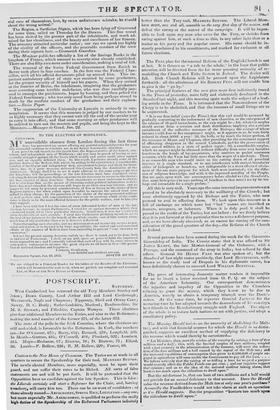The PEEL plan for the internal Reform of the English
Church is out at last. It is thrown as " a tub to the whale," in the hope that public attention will be diverted from the far more pressing necessity of re- modelling the Church and Tithe System in Ireland. The device will fail. Irish Church Reform will be pressed upon the Legislature forthwith : all the adroitness of Sir ROBERT PEEL will not enable him
to give it the " go by."
The principal features of the new plan were first indistinctly traced
in the Times of yesterday, more fully and elaborately developed in the Standard last night, and this morning again made the subject of a lead- ing article in the Times. It is intimated that the Non-residence of the Clergy is to be abolished, and that the incomes of small livings arc to
be augmented,
44 It is our firm belief (says the Times) that this end would be answered by gradually converting to the endowment of new churches, or the enlargement of the salaries of ill-paid incumbents, as the case might be—Ist, whatever surplus should accrue from a revision and fresh distribution, implying also a certain curtailment of the collective revenues of the Bishops ; the average of whose incomes (with four or five exceptions) might, as it appears to us, be very fairly reduced to about 3000/. a year: tkl, the bulk, or by much the larger portion, of the revenues of Deans and Chapters, after providing for the convenient support of officiating clergymen in the several Cathedrals, and for the meservation of those sacred edifices in a state of perfect repair : 3d, a considerable surplus, which we suspect might be obtained without difficulty from some very lucrative benefices in the hands of lay-proprietors, who contrive to pocket enormous revenues, while the Vicar has little more than the wages of a mechanic. There is no reasonable man who would insist on the cutting down of all parochial incomes to a single standard, or to any interference with ancient boundaries either of bishoprics or benefices, nut indispensable to a more effeetn rl attain- ment of the one main purpose for which both were instituted ; viz. the diffu- sion of religious knowledge, and with it the improved morality of the People. But we quite agree with our contemporary before alluded to the Standard). that some bishoprics (be says nothing of benefices in that sense) ate by far too large and intractable fur a single prelate."
All this is very well. Years ago the same internal improvements were
proved to be absolutely necessary to the wellbeing of the Church ; but were obstinately opposed by the Bishops and the Tories, who now pretend to zeal iii effecting them. We look upon this measure as a bill of exchange on which none but " bad " names are inscribed as drawers, accepters, or indorsers. When it is duly paid, it shall be
passed to the credit of the Tories, but not before : fur we firmly believe that it is put forward at this particular time to serve a dishonest purpose, and, as we have already observed, as an excuse for staving off the con- sideration of the grand question of the day—the Reform of the Church in Ireland.


























 Previous page
Previous page